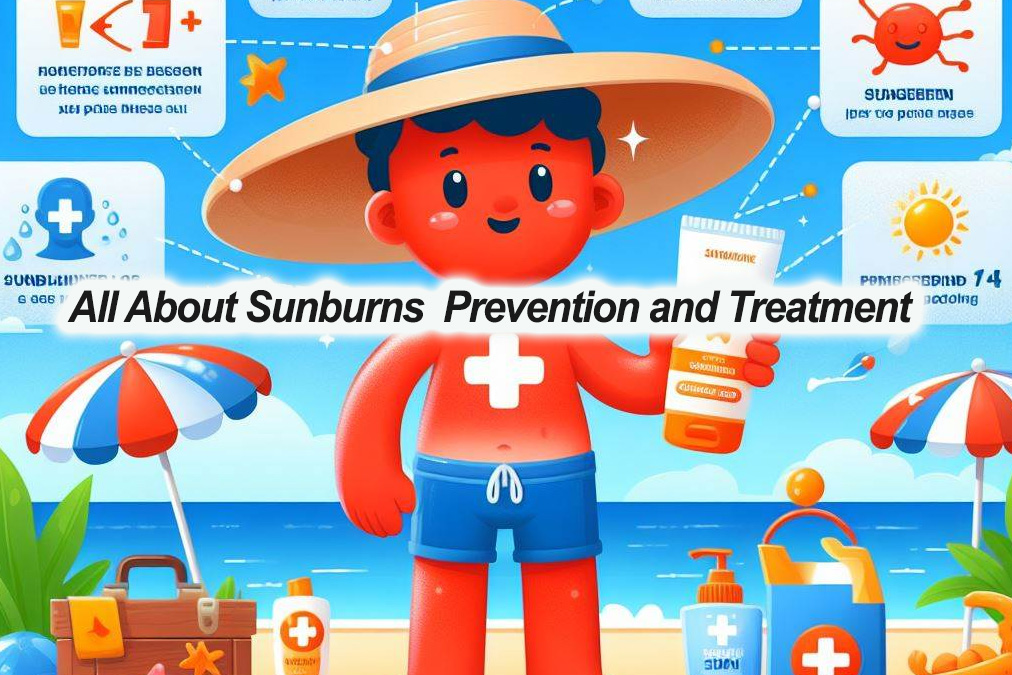Sunburns occur when the skin is overexposed to ultraviolet (UV) radiation from the sun, leading to redness, pain, and inflammation. Here’s everything you need to know about preventing and treating sunburns:
Prevention
- Use Sunscreen: Apply a broad-spectrum sunscreen with an SPF of at least 30 to all exposed skin, including your face, neck, ears, and hands. Reapply every two hours, or more often if swimming or sweating.
- Seek Shade: Limit your time in direct sunlight, especially during peak hours between 10 a.m. and 4 p.m. Seek shade under trees, umbrellas, or awnings when outdoors.
- Wear Protective Clothing: Cover up with lightweight, long-sleeved shirts, pants, hats, and sunglasses with UV protection to shield your skin from the sun’s harmful rays.
- Avoid Tanning Beds: Tanning beds emit UV radiation that can cause sunburns and increase the risk of skin cancer. Opt for sunless tanning products instead.
- Stay Hydrated: Drink plenty of water to keep your skin hydrated and help prevent dehydration, which can worsen sunburn symptoms.
- Be Extra Cautious Near Water and Sand: Water and sand reflect UV rays, increasing your risk of sunburn. Apply sunscreen more frequently and take extra precautions when near these surfaces.
Treatment
- Cool the Skin: Take a cool bath or shower, or apply cool compresses to the affected area to help soothe the skin and reduce inflammation.
- Hydrate: Drink plenty of water to help replenish fluids lost due to sun exposure and prevent dehydration.
- Moisturize: Apply a gentle, fragrance-free moisturizer or aloe vera gel to the sunburned skin to help soothe and hydrate it.
- Take Pain Relievers: Over-the-counter pain relievers like ibuprofen or aspirin can help reduce pain and inflammation associated with sunburns.
- Avoid Further Sun Exposure: Protect sunburned skin from further damage by staying out of the sun until it heals completely. Cover up with clothing, hats, and sunglasses when outdoors.
- Use Topical Treatments: Apply hydrocortisone cream or calamine lotion to relieve itching and discomfort. Avoid using products containing benzocaine or lidocaine, as they can irritate the skin further.
- Stay Cool: Keep the affected area cool and avoid tight or restrictive clothing that may further irritate the skin.
- Avoid Popping Blisters: If blisters develop, resist the urge to pop them, as this can increase the risk of infection and slow the healing process.
- Stay Hydrated: Drink plenty of water to help your body recover from the effects of sunburn and promote healing.
When to See a Doctor
- If you have severe sunburn covering a large area of your body.
- If you experience symptoms like fever, chills, nausea, or vomiting.
- If blisters develop or if the sunburn is extremely painful or does not improve after a few days.
Conclusion
Preventing sunburns is essential for maintaining healthy skin and reducing the risk of skin cancer. By following sun safety tips and taking precautions when outdoors, you can minimize your risk of sunburn. If you do get sunburned, prompt treatment can help relieve symptoms and promote healing. Remember to protect your skin every day, not just on sunny days, to maintain optimal skin health.

